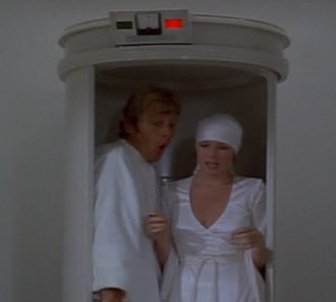This is an almost laughable prospect, but how cool would it be if these guys could pull it off?
link:
http://www.masshightech.com/stories...-to-use-empty-tracks-for-small-rail-cars.html
Rail-Pod hopes to use empty tracks for small rail cars
Friday, April 3, 2009
Brendan Lynch
MBTA patrons may not believe this, but a local startup has taken a look at public transportation, and ? you might want to be sitting down for this ? found it?s not quite as efficient as it might be.
Rail-Pod Inc. wants to make public transportation more efficient, and more cost-effective, with an off beat approach, according to co-founder Brendan English. The Belmont-based startup?s automated pods would carry two people and run on half of an existing set of railroad tracks to the passenger?s destination without stopping. Minor modifications could make the other half of a track available as a passing lane to avoid backups.
While public transportation is only profitable during rush hour, Rail-Pod?s on-demand service would make money on every trip, since it wouldn?t have to run near-empty trains at off-peak hours, English said. Since they?re automated, the electric-powered pods could run 24-7, after last call or the last inning of a late-running Red Sox game.
Such pods, an example of personal rapid transit, aren?t new ? the concept has been around for 30 to 40 years, according to Jose Gomez-Ibanez, a professor of urban planning and public policy at Harvard University?s Kennedy School of Government. He said the technology may be appealing and may have niche applications, but isn?t practical on a wider scale.
?It?s almost as if you?re reproducing the highway system,? Gomez-Ibanez said.
Rail-Pod isn?t looking to supplant the MBTA or the Mass Pike just yet. The company plans to focus on establishing feeder routes to existing rail-lines, running on existing routes when traditional trains are not running behind the little cars, and running routes on unused tracks in tourist destinations. One such feeder route, English cites as an example, could run on unused track from the commuter rail station in Needham through Dover and Medfield. English said he doesn?t see dealing with transportation bureaucracies as a problem.
?Politics are a part of every startup,? he said.
The four-person, bootstrapped startup was founded in late 2007 by English ? an engineer on unrelated aviation projects at the U.S. Department of Transportation?s Volpe National Transportation Systems Center in Cambridge ? along with Blair Morad, and twins Steve and Allen Mackey, all of whom are University of Massachusetts Amherst alumni. Rail-Pod, which is starting to look for funding, plans to have a prototype ready for demonstration by the end of the year, English said.
The automated pods are run by a small on-board computer, which takes information from a gyro-stabilization system; forward-looking obstruction sensors, which uses sonar and lidar to sense people, other pods or branches on the track; and ?skids? ? electromechanically controlled ski-like protrusions that lower to stabilize the pod at stops or during emergencies.
MIT startup Course Zero Automation, based in Boston, provided the pod with its inertial navigation unit, slightly modified to the specifications of the Rail-Pod?s hardware. Course Zero, which is putting the finishing touches on its final production unit, let Rail-Pod use the system as a way to demonstrate its technology, according to Course Zero founders Ted Blackman and Josh Siegel. The system balances the pod on the single rail and tells the computer whether the pod is leaning, and its rate of acceleration and deceleration.
?We get our logo on it,? Blackman said.
link:
http://www.masshightech.com/stories...-to-use-empty-tracks-for-small-rail-cars.html





